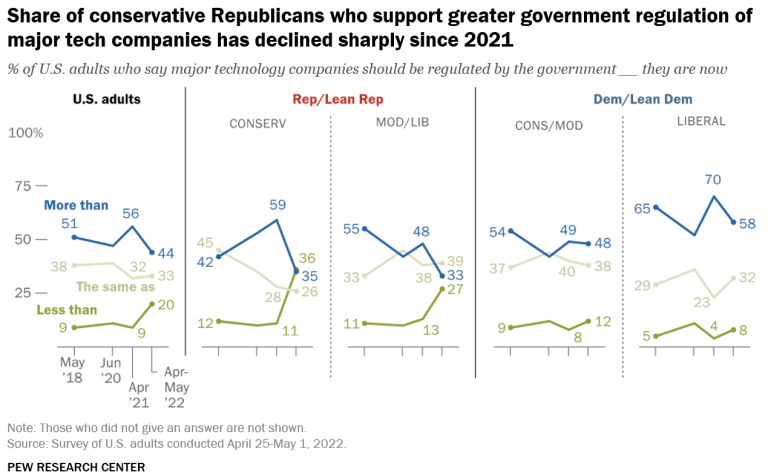Despite DC Sound And Fury, Public Support For Regulating ‘Big Tech’ Is Actually Down
For several years now there's been an endless amount of clamor in DC about how we need to regulate big tech." Unfortunately, many of the solutions on this front have ranged from incoherent to performative, failing utterly to actually shore up genuine problems in the sector (catch and kill tactics, mindless consolidation, vast privacy and surveillance issues).
Leading the charge for reform that isn't actually reform has been the GOP, a party very angry because some social media companies began belatedly and sloppily moderating race-baiting political propaganda and hate speech, cornerstones of GOP power in the face of a shifting and aging electorate.
Despite three years of press coverage of the need to regulate big tech" (which again can have inconsistent and incoherent definitions), a new Pew study makes it clear that support for regulating big tech" across both sides of the aisle has actually... decreased, with 44 percent of Americans believing major technology companies should be regulated more than they are now, down from 56 percent in April 2021.
Despite all the endless noise from the likes of Ken Buck and Josh Hawley about how big tech is a giant, dangerous, devil machine and must be regulated" to save the world from alien pedo grifters (or whatever the argument is this week), even support for it among Republicans is way down:

So the public, including Republicans, don't actually support regulating big tech" (whatever that even means to them). And they might support it less if the press did a better job explaining how many of the solutions being bandied about are performative, and often involve trying to mandate the forced carriage of authoritarian propaganda (see the assault on Section 230).
For years, experts pointed out that U.S. antitrust reform had grown toothless and frail, our competition laws needed updating in the Amazon era, and are consumers happy?" (the traditional consumer welfare standard) doesn't actually measure all aspects of potential harm in complex markets.
So the need for reform is genuine, but even the best solutions DC has tabled are weirdly narrow and not particularly well written. Several mask other agendas.
For example, the GOP attack on big tech" specifically is really about the mandated carriage of right-wing political propaganda. This gets dressed up as antitrust reform," and a fight for free speech" against censorship," which itself has proven to be effective propaganda for those that don't actually understand the real threat of authoritarianism and content moderation at scale (see Elon Musk).
The Pew survey makes it pretty clear that this effort - to reframe sloppy, belated content moderation of largely right-wing hate speech and political propaganda as broad censorship of political opinions across all of social media and all political ideologies" - has been rather effective:

Data keeps showing that most content moderation is biased" against misinformation and hate speech, not conservatives specifically. It's just that as the GOP has shifted harder toward bigotry, authoritarianism, and bullshit in the Trump era, they're engaging in more misinformation and hate speech online. The cognitive dissonance to process this reality is too difficult, so they instead embrace victimization.
The GOP largely wants the public to believe that any effort to regulate hate speech and political propaganda is an act of vile censorship. Because propaganda is all the party has. It's facing unfavorable shifting demographics and its actual policies are broadly unpopular (see: abortion, book bans, firing teachers for acknowledging that slavery is real).
The sad irony to all of this is that this GOP quest to use antitrust reform" as leverage in a bad faith quest to perpetuate propaganda will likely result in none of the actual problems with big tech getting fixed. This distorted, politicized version of the need to regulate big tech" has also distracted policymakers from countless other segments rife with monopoly harms (telecom, banking, travel, insurance).
In the end the GOP's attack on big tech" isn't based on reality, doesn't propose any real solutions for the broader markets or public, and isn't supported by huge swaths of voters anyway. Just a big, dumb noise machine whose output is anger and confusion.